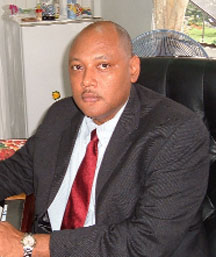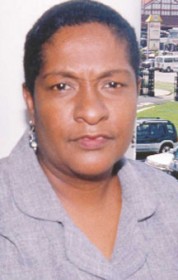-Trotman floats opposition election boycott
Opposition parties yesterday continued to call on the administration to agree to an international investigation into the actions of the ‘phantom squad,’ saying it should be eager if it has nothing to hide.
Representatives from the main opposition PNCR and the AFC yesterday expressed disappointment at the government’s stance at the just-concluded United Nations Human Rights Council (UNHRC) caucus in Geneva, Switzerland. The administration stood its ground on the issue, in the face of calls by Canada and the UK, for an international probe to be held into the ‘phantom squad.’ The United Kingdom Ambassador Bob Last on Thursday maintained that an independent investigation is an issue that requires attention as the report on Guyana’s human rights record was adopted by the Council.

“Firstly, in as much as we are disappointed at the government’s reaction and response, we are not surprised. A perpetrator of an offence rarely breaks down and confesses, or willingly submits to an investigation and to sanctions,” AFC leader Raphael Trotman told Stabroek News yesterday.
Trotman went further by suggesting that opposition parties should refuse to participate in any elections until the investigation is done. “To do otherwise would be to provide a validation of everything that happened and we would have no right, moral or otherwise, to say anything in the future and the world would be encouraged to scoff at us as not being serious and patriotic,” he noted.
Similar sentiments were expressed by PNCR Shadow Home Minister Deborah Backer, who said her party was also not surprised at the administration’s reluctance to have such a probe. She pointed out that if the government has nothing to hide, then it should be -anxious to have such an investigation. She said it would then put to rest any lingering doubts about the roles that members of the administration may have played in the actions of the squad. “This is part of history that needs to be put to rest and unless the government knows more than they are saying this is a good opportunity for them to silence the critics once and for all,” Backer told this newspaper. “This is a chapter of Guyana’s history that needs to be closed and we have to make sure we put things in place so that it does not happen again.”

Meanwhile, Trotman said that the behaviour of the government is “very characteristic of a guilty perpetrator who has been ‘busted.’” “A person or government with nothing to hide will readily agree to an investigation. It is therefore incumbent on all of us Guyanese, including political parties and civil society and all others who yearn for a better society to exert pressure to force the investigation,” he urged.
Trotman said he believed that the findings in the report, as adopted by the UNHRC, are “vindication that there were widespread atrocities committed in Guyana and brings a small, but yet powerful measure of justice to the thousands who were victims of these atrocities.” He added, “We in the AFC wish to thank the UK for remaining steadfast and committed to its previous position that there must be an inquiry and recognise that we need to demonstrate our solidarity in addressing this sordid issue.”
Late last year, the joint opposition parties had released a dossier on human rights abuses here, which they said showed evidence of the deteriorating security situation here. The dossier, compiled by the PNCR, the AFC, GAP, the WPA and the NFA, chronicled a decade and a half of unlawful killings and warned that a failure to launch an international investigation could fuel a cycle of hatred that could stoke the return of violence. Among the contents of the document are a partial list of citizens unlawfully killed between 1993 and 2002; a partial list of citizens allegedly shot to death [and] otherwise unlawfully killed by the ‘Black Clothes’ squad or other rogue elements of the security services, the ‘phantom squad,’ as well as other instances of extra-judicial killing, execution or assassination; and a full list of extra-judicial and other killings between 1993 and 2009, numbering 449. The parties said that because murders were part of the catalogue, they were committed to the fact that statutes of limitation do not apply.
Government had pilloried the dossier and since the document was shared with the US State Department and heads of the Commonwealth along with other countries and groups, there have been no further actions.
Yesterday, Trotman said that the opposition parties would now “have to meet and decide whether to allow this matter to be swept under the carpet or whether it is sufficiently serious to warrant further action.” He added, “I believe that we owe it to the relatives of those who lost their lives at the hands of bandits, terrorists and by phantoms to bring a complete closure to this dark chapter of Guyana’s history. This can only be done if there is a complete, independent and all encompassing investigation carried out by the UN.”
According to him, for the world to “finally recognise our call, and for us to do nothing, would be the ultimate act of abdication and betrayal, which should lead to the condemnation of all persons, groups, organisations and political parties who fought for justice and recently compiled the dossier.”
Backer also said that the joint opposition parties would not have to meet to decide on the way forward.
In its formal reply to the UNHRC, the administration rejected calls by the UK and Canada for independent probes into allegations of human rights abuses here, including murders and extra-judicial killings committed by members of the armed forces and a ‘phantom squad.’
In addition to the UK’s position, Amnesty International (AI) on Thursday expressed regret that Guyana did not commit to an independent inquiry.




